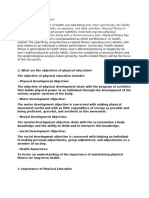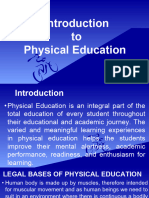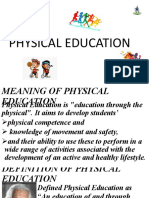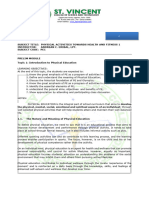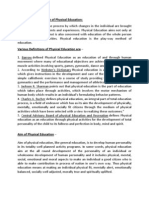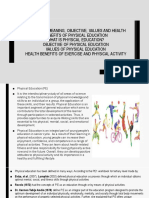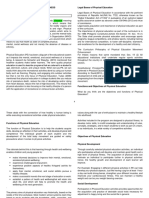0 ratings0% found this document useful (0 votes)
0 viewsOkue
Okue
Uploaded by
ilagangiancarlo0306Copyright:
© All Rights Reserved
Available Formats
Download as DOCX, PDF, TXT or read online from Scribd
Okue
Okue
Uploaded by
ilagangiancarlo03060 ratings0% found this document useful (0 votes)
0 views1 pageOriginal Title
okue
Copyright
© © All Rights Reserved
Available Formats
DOCX, PDF, TXT or read online from Scribd
Share this document
Did you find this document useful?
Is this content inappropriate?
Copyright:
© All Rights Reserved
Available Formats
Download as DOCX, PDF, TXT or read online from Scribd
Download as docx, pdf, or txt
0 ratings0% found this document useful (0 votes)
0 views1 pageOkue
Okue
Uploaded by
ilagangiancarlo0306Copyright:
© All Rights Reserved
Available Formats
Download as DOCX, PDF, TXT or read online from Scribd
Download as docx, pdf, or txt
You are on page 1of 1
GIAN CARLO L.
ILAGAN PATHFIT
BSCS - 1B
1. What is Physical Education?
• Physical Education (PE) is an educational discipline focused on developing
students' physical abilities, promoting health, and encouraging lifelong fitness
habits through various physical activities. It combines aspects of physical
fitness, motor skills, and the understanding of movement, aiming not only to
enhance physical well-being but also to instill values such as teamwork,
sportsmanship, and discipline among students.
2. What are the functions of Physical Education and it's meaning?
• The functions of Physical Education serve multiple purposes, primarily
focusing on physical, social, emotional, and cognitive development. Physically,
it aims to improve strength, coordination, and overall fitness. Socially, it fosters
teamwork and communication, while emotionally, it boosts self-esteem and
confidence through participation in sports. Cognitively, PE teaches principles of
movement and health, helping students make informed lifestyle choices.
3. What are the goals of Physical Education?
• The goals of Physical Education are centered on encouraging a healthy
lifestyle and promoting the importance of physical activity. They aim to develop
physical competence and confidence in various activities, instill an appreciation
for fitness, encourage social interaction through teamwork, and promote
critical thinking about health and exercise, thereby preparing students for a
lifetime of wellness.
4. What are the objectives of Physical Education?
• The objectives of Physical Education are specific outcomes that delineate
what the program seeks to achieve. These include improving students' physical
fitness levels, teaching fundamental motor skills and movement patterns,
instilling an understanding of the importance of nutrition, and fostering a
lifelong appreciation for physical activity as a means of maintaining health and
well-being.
You might also like
- Module 1Document18 pagesModule 1Jelie Mae Castroverde100% (1)
- Chapter 1 (Movement Enhancement)Document24 pagesChapter 1 (Movement Enhancement)Rea Joy100% (1)
- (GRP 72 TPE) Assignment 1Document2 pages(GRP 72 TPE) Assignment 1anyarose017No ratings yet
- Path FitDocument27 pagesPath FitkrisevvoneNo ratings yet
- Self-Testing Activities: Mindoro State UniversityDocument62 pagesSelf-Testing Activities: Mindoro State UniversityClaudette AguilaNo ratings yet
- Physical EducationDocument2 pagesPhysical EducationGerard Philip AgdumaNo ratings yet
- Physical Education (Yoga) Unit 1 NotesDocument8 pagesPhysical Education (Yoga) Unit 1 Notesaayurana01No ratings yet
- Lesson 2Document23 pagesLesson 2Arriene Chris Ocho DiongsonNo ratings yet
- Physical Education and FitnessDocument2 pagesPhysical Education and FitnessAyeshaNo ratings yet
- Reviewer PathfitDocument10 pagesReviewer PathfitCherish Faith TubigNo ratings yet
- Foundation of Physical Education UNIT 2Document6 pagesFoundation of Physical Education UNIT 2Sreelakshmi MuttomNo ratings yet
- Physical EducationDocument10 pagesPhysical EducationAhsana T.KNo ratings yet
- Lectture 1 - Why PE and Health Are ImportantDocument4 pagesLectture 1 - Why PE and Health Are ImportantAngela GamayonNo ratings yet
- Assignment On Career in PEDocument9 pagesAssignment On Career in PEGarv GolaNo ratings yet
- Definition of PE Sports & RecreationDocument20 pagesDefinition of PE Sports & RecreationElyzee S ColumbresNo ratings yet
- To Physical EducationDocument13 pagesTo Physical EducationcerikaconocidoNo ratings yet
- PE Purpose ObjectivesDocument1 pagePE Purpose ObjectivesJake Marcelo-TapatNo ratings yet
- 02A Lesson Proper For Week 1: Physical Education 1Document17 pages02A Lesson Proper For Week 1: Physical Education 11102F- Domasig, Rochelle P.No ratings yet
- Why Physical EducationDocument5 pagesWhy Physical Educationmercy agbo100% (1)
- PHYSICAL-EDUCATIONand HealthDocument35 pagesPHYSICAL-EDUCATIONand HealthEMNASE, Rea Mae, M.No ratings yet
- Objective of Physical Educaton: Good LifeDocument8 pagesObjective of Physical Educaton: Good LifeLorraine AlboNo ratings yet
- Pathfit NotesDocument3 pagesPathfit NotesAlvarez, Chesna LoiseNo ratings yet
- What Is Physical Education - NotesDocument16 pagesWhat Is Physical Education - Notess2300086No ratings yet
- Physical EducationDocument4 pagesPhysical EducationMelisa Mabacquiao SerquillosNo ratings yet
- What Is The Significant Contribution of Physical EducationDocument4 pagesWhat Is The Significant Contribution of Physical EducationGUDINA MENGESHA MEGNAKANo ratings yet
- PEDocument10 pagesPERaul OrcigaNo ratings yet
- Physical Education - Grade 10Document23 pagesPhysical Education - Grade 10jeffinjoffi67% (3)
- Chapter 1 PeDocument2 pagesChapter 1 PeJennifer OgadNo ratings yet
- Pat Class 9 Unit 1Document10 pagesPat Class 9 Unit 1tanu99n89No ratings yet
- Physical EducationDocument3 pagesPhysical EducationCHARIZE MAE NAVARRONo ratings yet
- Physical EducationDocument22 pagesPhysical EducationJessica Denise100% (1)
- Pe 101 Final Module For FitnessDocument120 pagesPe 101 Final Module For FitnessRezia Lustria100% (1)
- The Nature and Meaning of Physical EducationDocument15 pagesThe Nature and Meaning of Physical EducationClarissa MahomocNo ratings yet
- Week 2 - Core Concepts in Pe (With History of Pe)Document25 pagesWeek 2 - Core Concepts in Pe (With History of Pe)MARITHE ROJIANNE MERCADONo ratings yet
- Edu722 Comprehensive Pe Jmusic J ArtsDocument20 pagesEdu722 Comprehensive Pe Jmusic J ArtsDyna Jangit PajoteaNo ratings yet
- PE4Document2 pagesPE4taichiokumura13No ratings yet
- Unveiling The Essence of Physical EducationDocument2 pagesUnveiling The Essence of Physical Educationn2mm51bau5No ratings yet
- Unit 1 Physical EducationDocument9 pagesUnit 1 Physical EducationRain Quarteros100% (1)
- Cas - Human Kinetics DepartmentDocument57 pagesCas - Human Kinetics DepartmentKent Vincent B. PerezNo ratings yet
- 1-Unit-I - Changing Trends & Career in Physical Education-XiDocument50 pages1-Unit-I - Changing Trends & Career in Physical Education-XiBiswakrit SatapathyNo ratings yet
- ERIBAL-PE1_-_PRELIM_MODULE_-_BSA1_A_B_C__DDocument15 pagesERIBAL-PE1_-_PRELIM_MODULE_-_BSA1_A_B_C__DJohnny PadernalNo ratings yet
- PE N YogaDocument7 pagesPE N YogabharathiNo ratings yet
- Chapter 1: Meaning, Objective, Values and HealthDocument9 pagesChapter 1: Meaning, Objective, Values and HealthMark SacristanNo ratings yet
- Objectivesofphysicaleducationandsports 240408124433 95a814edDocument15 pagesObjectivesofphysicaleducationandsports 240408124433 95a814ednomanaenglishmanNo ratings yet
- PE 1 MODULE 1 and 2Document17 pagesPE 1 MODULE 1 and 2Ks QueenNo ratings yet
- Physical Education 1Document10 pagesPhysical Education 1kayekate80No ratings yet
- I. Physical EducationDocument5 pagesI. Physical Educationrenalynsoriano0No ratings yet
- P E-GymnasticsDocument247 pagesP E-GymnasticsCarmela Aduca100% (1)
- Pe11 ReviewerDocument5 pagesPe11 ReviewerRichelle OdiverNo ratings yet
- Spec 10 Teaching Pe & Health in The Elementary GradesDocument8 pagesSpec 10 Teaching Pe & Health in The Elementary GradesDatumama DimaNo ratings yet
- Physical Education: Objectives of The DepartmentDocument5 pagesPhysical Education: Objectives of The DepartmentChristian Walter ReductoNo ratings yet
- Physical Education - DefinitionDocument4 pagesPhysical Education - DefinitionRinoa GuntalilibNo ratings yet
- Pathfit 1 L1Document33 pagesPathfit 1 L1Camilo LacanlaleNo ratings yet
- Phed Reviewer Prelims Midterms FinalsDocument43 pagesPhed Reviewer Prelims Midterms FinalsDaniella GarelloNo ratings yet
- Lesson 1 Teaching Physical Education in Elementary GradesDocument4 pagesLesson 1 Teaching Physical Education in Elementary GradesMarsha de los SantosNo ratings yet
- Physical Education: PE 01 Physical Fitness and Related ActivitiesDocument11 pagesPhysical Education: PE 01 Physical Fitness and Related ActivitiesLev Mazed SulioNo ratings yet
- Reviewer in PathfitDocument11 pagesReviewer in Pathfitjuliusgrapes1No ratings yet
- BPEd 101 102Document52 pagesBPEd 101 102julegojaNo ratings yet
- Physical EducationDocument8 pagesPhysical EducationLESLIE MARTINEZNo ratings yet





